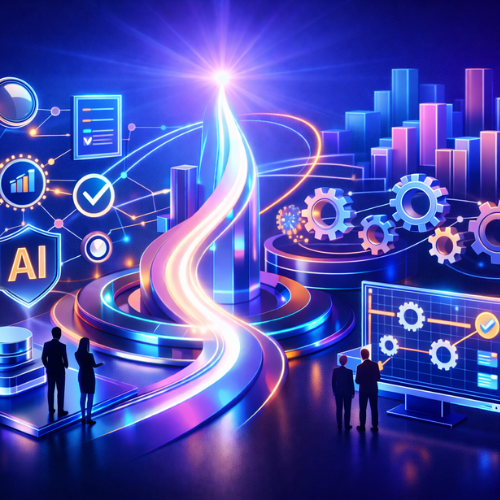The belief that artificial intelligence (AI) is only relevant to IT teams is rapidly becoming outdated. Today, AI training courses are no longer reserved for data scientists or software engineers, they’re essential for professionals across every industry. From customer service and healthcare to logistics, finance, and marketing, AI is transforming how work gets done. Whether it’s optimizing supply chains, improving customer interactions, or enabling data-driven decisions, AI is already embedded in everyday business operations. That’s why investing in the right AI training program is becoming critical for teams at every level.
Organizations that fail to provide AI training beyond their IT departments risk falling behind competitors who embrace AI across all functions. According to MIT Sloan Management, “Generative AI tools can improve worker performance by nearly 40%, particularly when tasks fall within AI’s capabilities.” As AI becomes a fundamental part of modern business, it is essential that employees at every level understand how AI works, how it impacts their roles, and how to use AI-driven tools effectively.
How AI is Already Changing Frontline Roles
AI is no longer just about automating back-end IT processes, it’s reshaping frontline roles across industries. Customer service, supply chain, logistics, and sales teams are now using AI-powered tools to boost efficiency, streamline workflows, and deliver better customer experiences. But without the right AI training, employees may struggle to use these tools effectively, limiting their impact. Enrolling teams in a structured AI training course or company-wide AI training program helps bridge that gap, equipping employees with the skills they need to unlock AI’s full potential.

One of the most visible examples of AI’s impact is in customer service, where AI-powered chatbots and intelligent CRM systems are changing how businesses interact with consumers. AI-driven chatbots can now handle up to 80% of routine customer inquiries, reducing response times and freeing up human agents to focus on more complex issues. IBM reports: “AI infused virtual agents can cut labor costs by reducing the reliance on human intervention— leading to as much as 30% decline in customer support service fees. Chatbots can also handle 80% of routine tasks and customer questions.”
In logistics and supply chain management, AI is playing a crucial role in enhancing inventory tracking, demand forecasting, and shipping efficiency. AI-powered systems can analyze real-time data to predict inventory shortages before they happen, optimize warehouse management, and improve delivery routes.
AI is also transforming decision-making at all levels of an organization. Many businesses are incorporating AI-powered analytics tools that help managers and frontline staff make data-driven decisions in real time. AI is now used to predict customer demand, optimize marketing campaigns, and identify fraud in financial transactions.
As AI continues to evolve, its role in frontline jobs will only grow. Businesses that invest in AI training for all employees, not just IT teams, will gain a competitive advantage in efficiency, decision-making, and customer experience.
Why AI Literacy is a Must-Have Skill
AI literacy is emerging as a core competency for today’s workforce, much like digital literacy did in the early 2000s. Employees who understand how AI works, how to use AI-powered tools, and how AI applies to their daily tasks are far better positioned to drive business success. A well-designed AI training program empowers teams with that knowledge. Without access to practical AI training courses, employees may misinterpret AI-generated recommendations, misuse insights, or resist adoption altogether. Investing in the right AI training course ensures your team can confidently navigate an AI-enabled workplace.
Beyond individual performance, AI literacy fosters a culture of innovation and adaptability. Companies that actively train employees in AI concepts report higher engagement, better cross-team collaboration, and improved problem-solving abilities. Employees who understand AI are more likely to identify automation opportunities, suggest AI-driven improvements, and embrace new technology rather than fear job displacement.
AI Training Must Extend Beyond IT
AI is no longer an isolated function within IT, it’s a business-wide transformation tool impacting every department, from customer service and logistics to sales and finance. When employees understand how AI applies to their specific roles, they become more productive, more engaged, and more capable of driving innovation. That’s why offering AI training courses to non-technical teams is just as important as upskilling IT. Organizations that restrict AI training to technical staff risk missing a critical opportunity. A company-wide AI training program helps unlock the full value of AI by empowering every employee, not just a select few.
Companies that invest in AI training beyond IT see higher adoption rates, stronger collaboration between teams, and a faster return on AI investments. As AI continues to shape the future of work, the most successful businesses will be those that ensure every employee is AI-literate, not just a select few in IT.
Is your workforce AI-ready? Let’s build a training program that equips your entire team for the future.
Learn More About Our AI Literacy Program
Frequently Asked Questions
AI literacy means understanding how AI works, how it affects your role, and how to use AI tools responsibly. It empowers employees in all departments—from marketing to logistics—to make better decisions, improve workflows, and innovate confidently. Learn more about our AI Literacy Programs.

